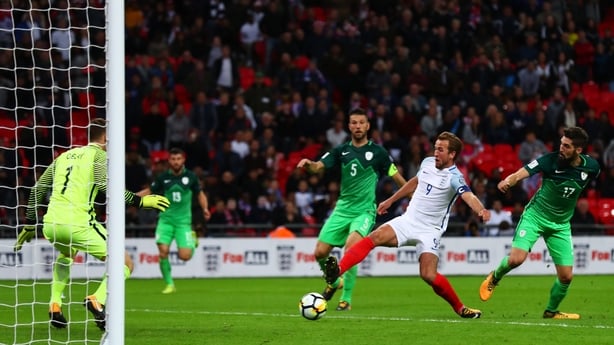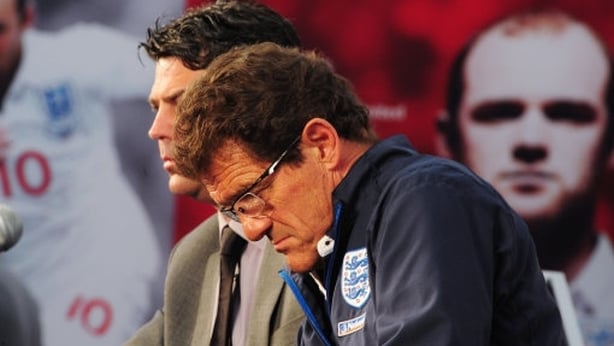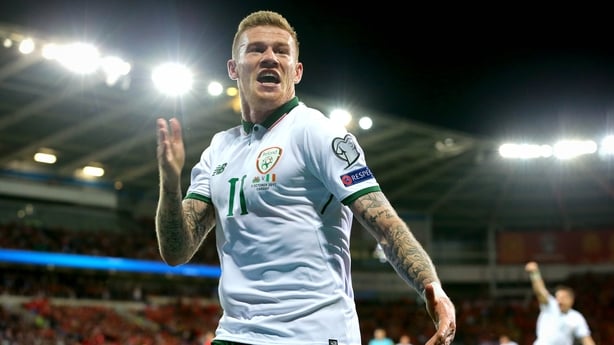The month of October highlighted once more the wildly different levels of enthusiasm for international football in England and Ireland.
While Wales's golden generation faces into yet another summer of watching the World Cup on television and the Scots are both seeking a new manager and contemplating launching a eugenics programme, England are bound for another World Cup journey.
They've only missed one of the past ten World Cups, the single failure being the one where cameras were invited behind the scenes in 1994.
They once knew hair-raising moments in qualifying but haven't experienced any of those since Steve McClaren fled to Holland that time.
In fact, England have not lost a qualification match, in either the World Cup or the European championship, so far this decade. Their last such loss came against Ukraine in October 2009, and even that came long after their qualification for the South African World Cup was mathematically assured.
It is true to say that 'the three lions' have had a run of some quite tame groups in that time, even allowing for the fact that they are perennial first seeds. But still, they've posted some remarkably efficient, almost Germanic, qualifying stats.
The man from Mars (an unwelcome illegal immigrant in Britain these days) might assume that the new ease with which England book their place in major tournaments would inspire some gratitude among their supporters.
But not a bit of it. Like Harold Wilson, the England football team is only good for stirring up apathy at this point.
Football fans in England greet the arrival of international week in much the same way that a generation of Irish kids used to greet the interruption of The Den by the Budget.
Gates at Wembley have been dwindling for some time and the ground was only two-thirds full when England secured qualification for Russia at the beginning of October.

England, unfortunately, are in an oddly joyless position as regards international football, whereby qualification is so routine as to represent no achievement whatsoever, while the tournaments themselves are short and brutish affairs which bring nothing but humiliation and recrimination.
The appointment of Gareth Southgate, whose managerial CV consisted of relegating Middlesbrough to the Championship and leading the England U21s to a group stage exit in the 2015 European Championship, offered final proof that the country couldn't be bothered anymore.
In years past, the FA chiefs may have felt obliged to scour the continent in search of some trophy-laden hotshot manager. But they've been down that road too many times.
If the appointment of Sam Allardyce represented a calculated FU to all the snooty pretensions of yesteryear, then the ultimate decision to settle on Southgate gave off a distinct 'yeah whatever' vibe.
The manner of Southgate's elevation to the England job put one in mind of the upgrading of the Holy Stone of Clonrichert to the status of a Class 2 relic.
The public were indifferent to their manager's slight CV. It feels a long time since the England national team occupied the centre of the football universe over there, when a man once stood in a Westminster by-election on a single issue platform of removing Graham Taylor as manager.
The 2010 World Cup represented something of a watershed. Previous England disasters had been pinned on managerial shortcomings. The FA made Fabio Capello the highest paid international manager on the planet on the understanding that he would make it all better. His record at club level suggested he was unfamiliar with the word 'failure', in either Italian or English.

But, like all England managers since, and even including, Alf Ramsey, Capello became intimately acquainted with the concept during his time there. At the beginning of 2012, with his stock as a manager gently dwindling, he summoned up as much outrage as he could over the FA's decision to strip John Terry of the international captaincy and used it as a pretext to get out of the job.
Irish people accused of reveling too much in England's footballing failure often like to insist that it's not down to old-fashioned postcolonial rancour, it's just that the English red tops talk up their boys too much.
This hasn't been true since South Africa. Indeed, in 2012, it was the Irish press and support that fell prey to embarrassing pre-tournament delusion.
England, by contrast, approached that tournament in an unnervingly low-key fashion and ended up doing OK. Better, in fact, than they have in any other tournament in the past decade, though that probably isn't saying much.
This brings us to Ireland. As we know, following the Irish football team is not always easy these days.
The crowd at Ireland home games is divided into two categories: those innocent souls who hoarsely and uncritically cheer on the boys in green like it's still Italia 90 and those who spend the entirety of the game grumbling and sighing at the quality of the football, as if they had arrived at the ground expecting to find Barcelona were playing, only to be disappointed.
(The away contingent are another matter altogether and tend, for obvious reasons, to be in a more celebratory mood pre-kick-off.)
But the euphoria which followed Ireland's victory in Cardiff indicated that the country hasn't descended to the level of apathy that runs rampant in England whenever their 'top boys' pull on the national kit.
For Ireland occupy that magic space whereby qualification is achievable but still an achievement.
Not good enough for qualification ever to become a tiresome formality, but not bad enough for it to become a slow-motion death march (not usually anyway).
The result has been an inordinately large number of play-off appearances since play-offs became a regular feature of the UEFA qualifying scene.

Since Euro '96, Ireland have participated in eight play-off ties across both the World Cup and European championships, more than any other UEFA affiliated country. Ukraine are the closest behind us with six playoff appearances.
That's a lot of gripping, nation-stopping encounters. A lot of nights like Cardiff a fortnight ago.
An added boon is that, with the traumatic exception of Euro 2012, Ireland have historically acquitted themselves well at major tournaments.
It helps, of course, that expectations are, and remain, considerably lower. In his first autobiography, Roy Keane contemptuously described Ireland's mission at the 1994 World Cup as "avoiding disgrace", a not especially lofty objective which was achieved - and then some - in the opening match.
From 2026, the World Cup will expand to 48-teams, as FIFA continue to generously widen the margin for error in qualifying. And it's only a matter of time before they seek to extend it to 64-teams. And after that the day won't be long coming when it's an 128-team event. And, in time, we could reach a stage where everybody will be invited to the party and qualification may well be abolished altogether.
(In one hundred years time, San Marino will probably pitch up at a World Cup, unless of course, they bravely take the Groucho Marx attitude to the whole thing and decide not to show in protest.)
And to think that old purists like Brian Glanville proclaimed that the end was nigh when Joao Havelange's FIFA said that 24 teams could take part. How thoroughly the whole thing has been dumbed down.
In the meantime, some people are slightly overreacting to the 48-team competition, at least insofar as it relates to Ireland. There were nagging fears that it would cheapen the magic of World Cup qualification. It might render it too easily earned and thus less of a treasured privilege.
Leave aside the underlying complacency. A closer look at the breakdown reveals that Europe's allocation is merely expanding from 13 to 16 teams. The extra slots are being distributed around the various confederations, with the blessed members of CONCACAF now availing of six places.
The bar for entry for to the World Cup will still be higher in 2026 than it is for the European championships since its expansion to 32 teams, and Irish fans didn't appear to enjoy France any the less for that.
Either way, the notion that World Cup qualification could become a doddle for Ireland is not something we need to be worrying about.


